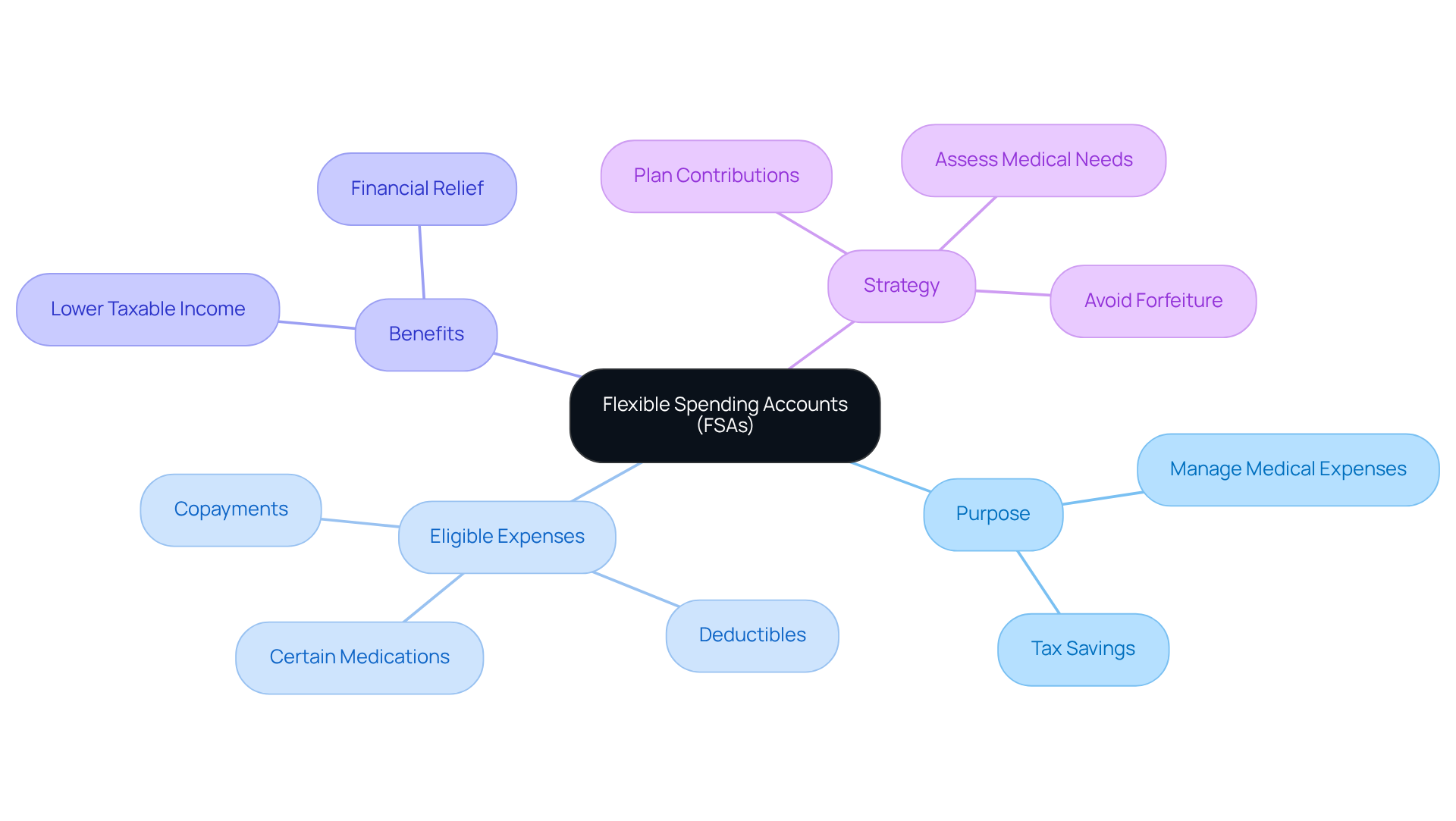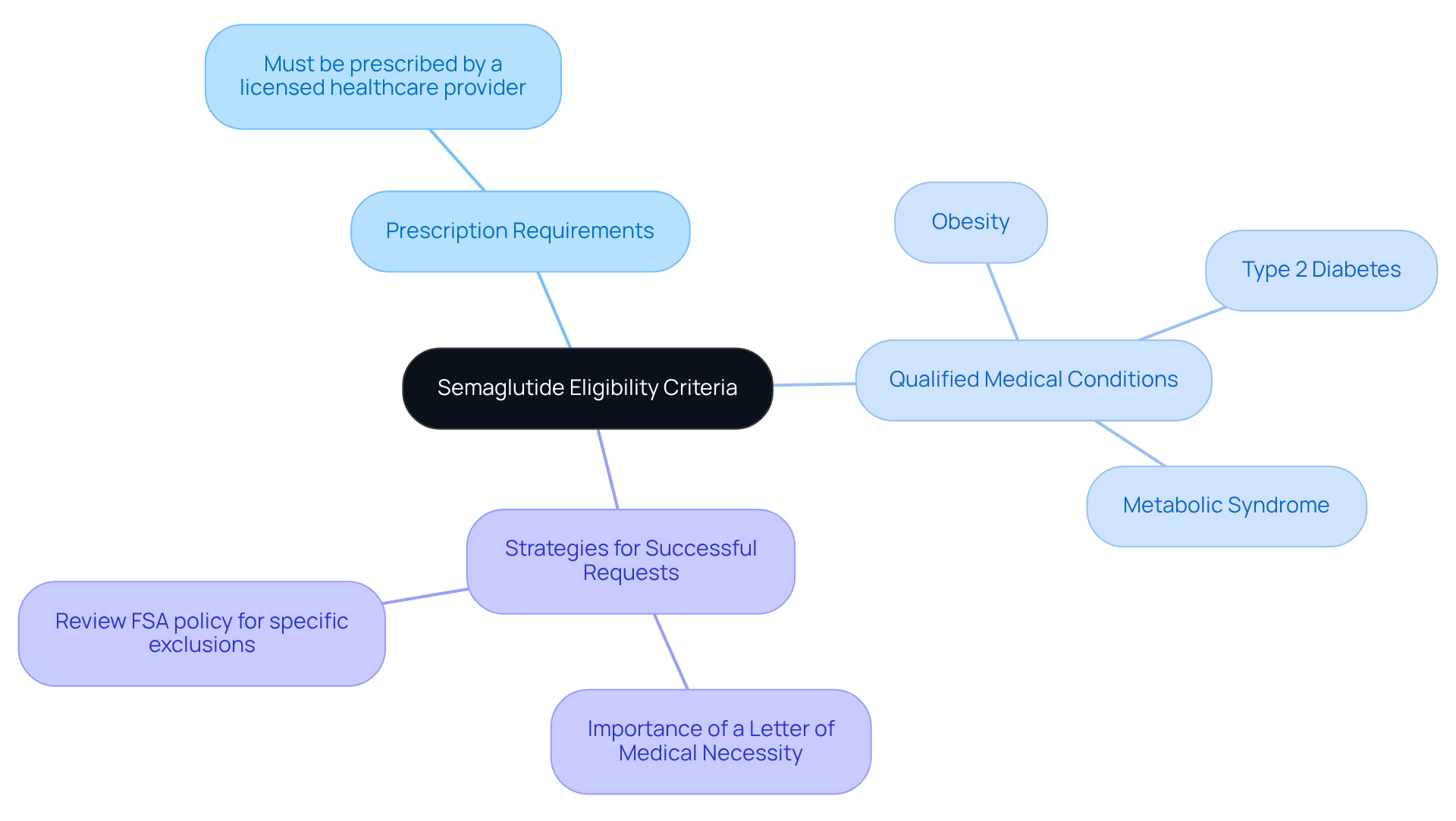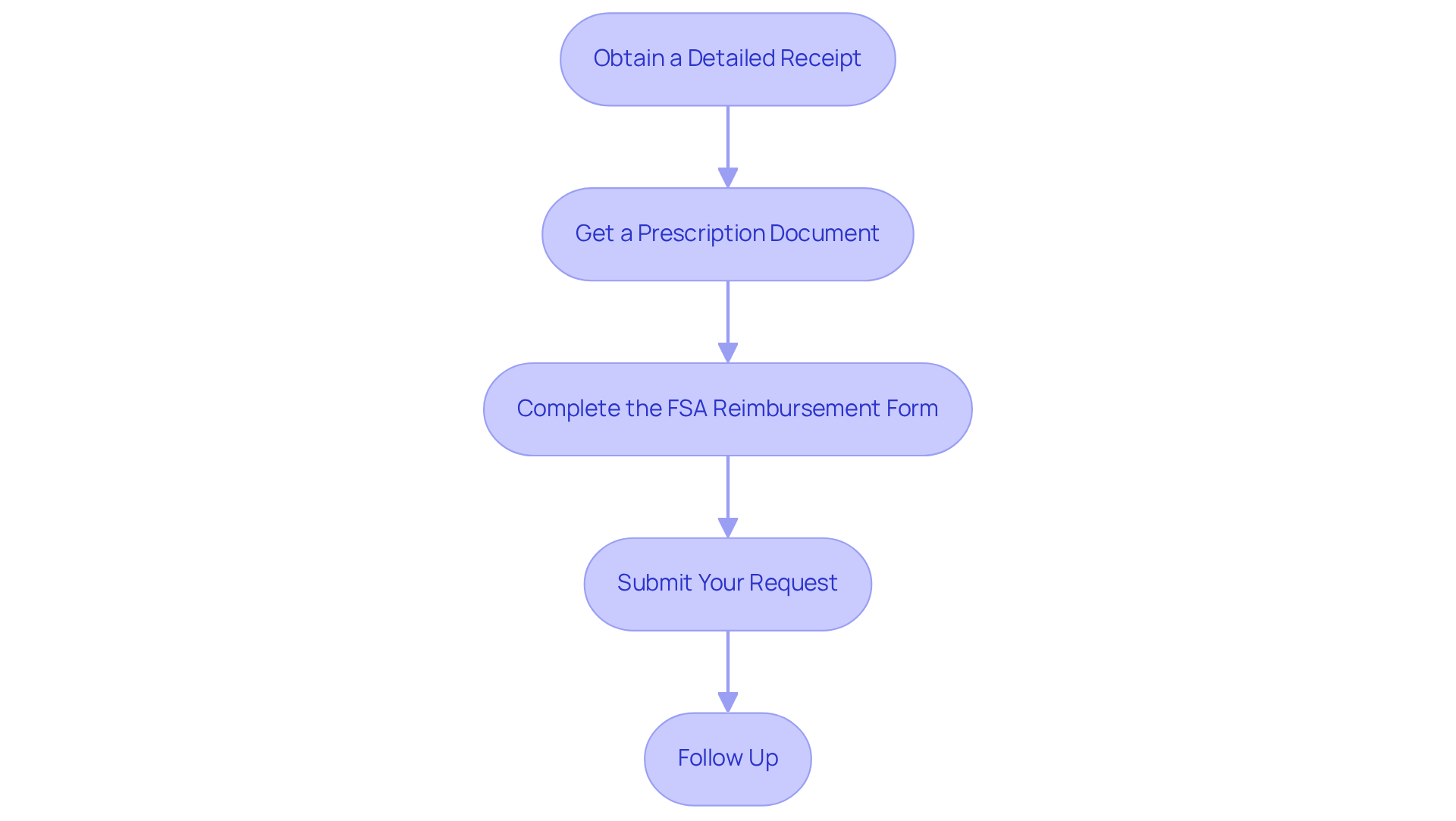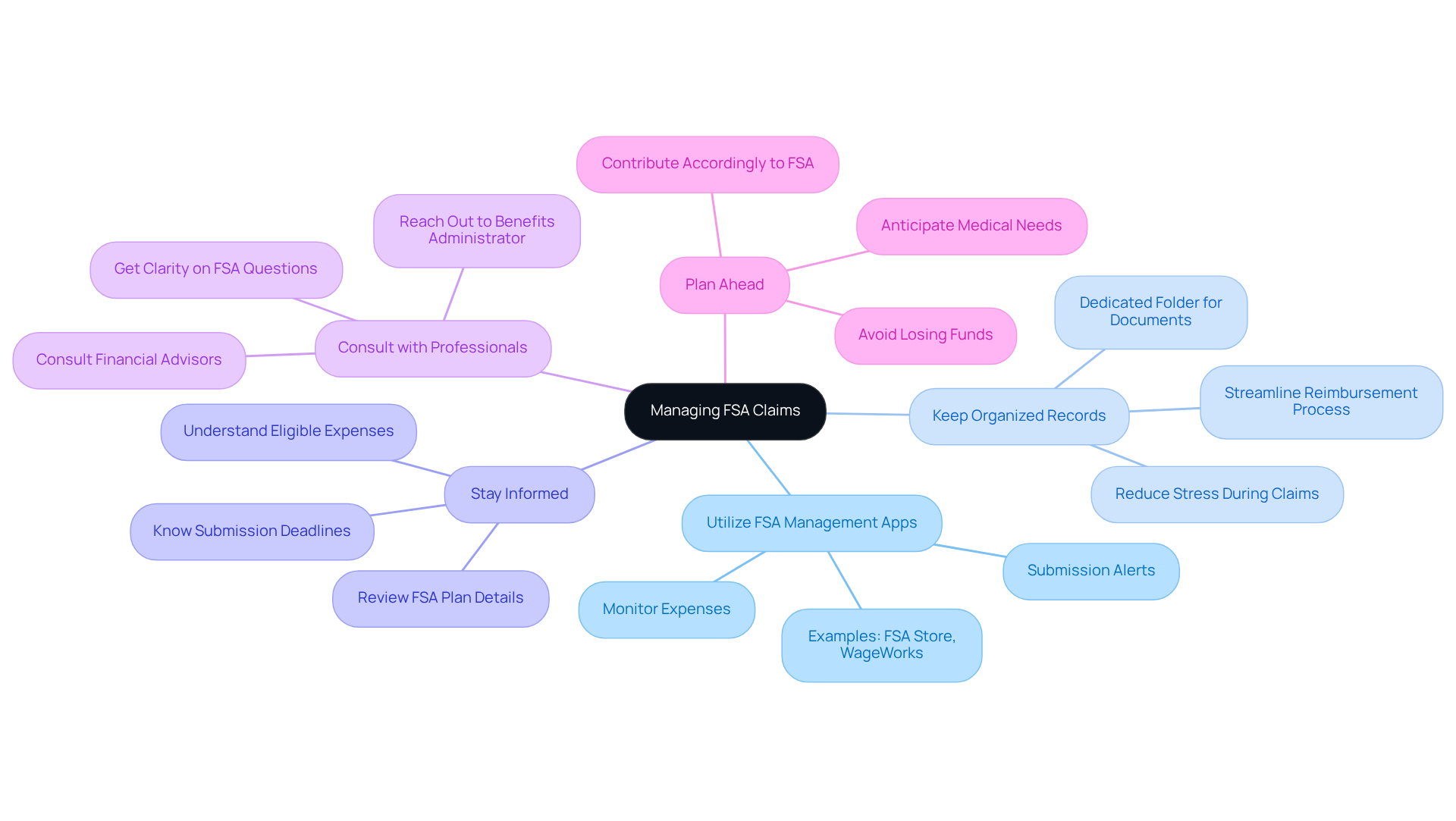Overview
If you’re navigating the complexities of managing your health, you may find that semaglutide could be eligible for reimbursement through a Flexible Spending Account (FSA). This is particularly true if it’s prescribed for qualified medical conditions like obesity or Type 2 diabetes, and if it aligns with IRS guidelines for medical necessity.
It’s important to remember that having a prescription is just the first step. You’ll also need a detailed receipt, and possibly a Letter of Medical Necessity, to help ensure a smooth reimbursement process. By taking these proactive steps, you can better verify your coverage and ease some of the stress that comes with these financial considerations.
Together, we can work towards your health goals, and understanding these reimbursement options is a vital part of that journey. You’re not alone in this; we’re here to support you every step of the way.
Introduction
Understanding the intricacies of Flexible Spending Accounts (FSAs) can truly be a game-changer for managing healthcare costs, especially when it comes to medications like semaglutide. We recognize that navigating these details can feel overwhelming, and this guide is here to help. It clarifies the eligibility criteria for semaglutide under FSA guidelines and outlines essential steps for verifying coverage and securing reimbursements. However, with the complexities surrounding FSA policies and the potential for unexpected exclusions, how can you ensure that you are maximizing your benefits while navigating the reimbursement process? Together, we can explore these challenges and find the best path forward.
Understand Flexible Spending Accounts (FSAs) and Their Purpose
Flexible Spending Accounts (FSAs) are wonderful tools that can help you manage your medical expenses more effectively. By allowing employees to set aside pre-tax dollars for eligible medical costs, these accounts can ease some of the financial burdens you may face. Provided by employers, FSAs can cover a range of expenses, including:
- Copayments
- Deductibles
- Certain medications
Understanding how FSAs work is essential for making the most of your budget. Contributions to an FSA can lower your taxable income, which means you could save money on taxes—something that can feel like a relief during times of financial strain. However, it’s important to remember that FSAs operate on a ‘use-it-or-lose-it’ basis. This means that any funds you don’t use by the end of the fiscal year may be forfeited.
To make the most of your FSA, consider strategizing your contributions wisely. Think about your upcoming medical needs and how to allocate your funds effectively. Together, we can navigate these financial decisions to ensure you feel supported and prepared. Remember, you’re not alone in this journey; we’re here to help you achieve your financial goals with confidence.
Identify Eligibility Criteria for Semaglutide Under FSA Guidelines
If you’re considering semaglutide and wondering if it is semaglutide FSA eligible, it’s crucial to know that it must be prescribed by a licensed healthcare provider for a qualified medical condition, such as obesity or weight management. According to IRS guidelines, medications need to primarily serve medical purposes to qualify for FSA reimbursement. Have you checked your FSA policy for any specific exclusions regarding weight loss medications? Reviewing your FSA program documents or consulting with your benefits administrator can help clarify any uncertainties you might have.
Did you know that over 137 million adults in the U.S. are eligible for semaglutide, primarily for weight loss, diabetes management, or cardiovascular prevention? This broad eligibility highlights the importance of understanding your specific plan’s coverage, ensuring you have the support you need on your journey.
Expert insights reveal that qualifying medical conditions for FSA reimbursement often include obesity, Type 2 diabetes, and metabolic syndrome, leading to inquiries about whether semaglutide is FSA eligible. To enhance your chances of a successful request for semaglutide prescriptions, consider providing a Letter of Medical Necessity (LMN) from your medical provider. This letter details the medical justification for your treatment. By ensuring that your prescription aligns with these criteria, you’re taking a proactive step toward achieving your health goals, and remember, we’re here for you every step of the way.
Verify Your Semaglutide Purchase for FSA Reimbursement
To ensure a smooth process for verifying your semaglutide purchase for FSA reimbursement and to take advantage of Minimal’s HSA/FSA payment options, we’re here to guide you through these steps:
-
Obtain a Detailed Receipt: Make sure your receipt includes the date of purchase, the name of the medication (semaglutide), the amount paid, and the pharmacy or provider’s information, as this will help you verify if it is semaglutide FSA eligible. This is essential for your reimbursement.
-
Get a Prescription Document: Keep a copy of the prescription from your healthcare provider, as this may be necessary for your reimbursement process. We understand that managing prescriptions can be overwhelming, but having this document on hand can ease your worries.
-
Complete the FSA Reimbursement Form: Accurately fill out your FSA reimbursement form, attaching both the receipt and the prescription documentation. Taking this step can feel daunting, but we’re here to support you.
-
Submit Your Request: Send your completed request form and supporting documents to your FSA administrator, either electronically or via mail, following your plan’s guidelines. Remember, you’re not alone in this; we’re here to help you navigate the process.
-
Follow Up: After submission, keep an eye on the status of your request to ensure it is processed and reimbursed in a timely manner. It’s perfectly normal to feel anxious during this time, but staying proactive can help ease your concerns.
At Minimal, we prioritize your privacy and are fully HIPAA compliant. You can trust that all your personal health information is securely handled and protected, allowing you to focus on your health journey. Together, we can achieve your goals, and we’re here for you every step of the way.
Explore Resources and Tips for Managing FSA Claims
Managing your FSA claims can feel overwhelming, but with the right resources and strategies, you can navigate this process with confidence. Here are some essential tips to help you along the way:
-
Utilize FSA Management Apps: Consider leveraging apps designed to monitor your expenses and send alerts for submission deadlines. Tools like FSA Store and WageWorks can significantly enhance your efficiency in managing FSA funds, allowing you to focus on what truly matters—your health.
-
Keep Organized Records: Creating a dedicated folder for all FSA-related documents, including receipts, prescriptions, and reimbursement forms, can make a world of difference. This organization streamlines the reimbursement process and ensures you have everything readily available when needed, reducing stress during claims.
-
Stay Informed: Regularly reviewing your FSA plan details and any updates from your employer is crucial. Being aware of eligible expenses, especially for treatments like Semaglutide, and deadlines helps you understand if semaglutide is FSA eligible, ensuring you’re getting the most out of your plan.
-
Consult with Professionals: If you have questions about your FSA or specific requests, don’t hesitate to reach out to your benefits administrator or a financial advisor who specializes in medical expenses. Their expertise can provide clarity and guidance. As one financial advisor noted, “Using technology to track FSA expenses can simplify the process and ensure you don’t miss out on eligible claims.”
-
Plan Ahead: Anticipating your medical needs for the year and contributing accordingly to your FSA can help you avoid losing funds at the end of the plan year. This proactive approach ensures you make the most of your contributions, allowing you to focus on your health journey without the worry of unused funds.
By implementing these strategies, you can navigate your FSA claims more effectively and optimize your healthcare spending. Remember, we’re here for you, and together, we can achieve your goals.
Conclusion
Understanding the eligibility of semaglutide under Flexible Spending Accounts (FSAs) is essential for those of you looking to manage healthcare expenses effectively. By recognizing the requirements for FSA coverage, you can maximize your benefits and ensure you are financially supported on your health journey. It’s important to verify FSA eligibility for semaglutide, as it can significantly aid in managing conditions like obesity and diabetes.
Key insights shared in this article highlight:
- The necessity of obtaining a prescription from a licensed healthcare provider
- The importance of keeping detailed receipts
- The steps involved in submitting FSA reimbursement requests
Additionally, we emphasize the value of utilizing resources and strategies to manage FSA claims effectively, such as leveraging technology and maintaining organized records.
Ultimately, navigating the complexities of FSA coverage for semaglutide can be an empowering process, leading to better health outcomes and financial relief. By staying informed and proactive, you can take charge of your healthcare spending, ensuring you make the most of your FSA benefits. Engaging with available resources and seeking professional advice can further enhance this journey, allowing for a more seamless experience in managing medical expenses. Remember, together, we can achieve your goals and support each other in this journey.
Frequently Asked Questions
What is a Flexible Spending Account (FSA)?
A Flexible Spending Account (FSA) is a financial tool that allows employees to set aside pre-tax dollars to cover eligible medical expenses, helping to manage medical costs more effectively.
What types of expenses can FSAs cover?
FSAs can cover a range of expenses, including copayments, deductibles, and certain medications.
How do contributions to an FSA affect my taxes?
Contributions to an FSA can lower your taxable income, potentially saving you money on taxes.
What does “use-it-or-lose-it” mean in relation to FSAs?
“Use-it-or-lose-it” means that any funds in your FSA that are not used by the end of the fiscal year may be forfeited.
How can I make the most of my FSA?
To maximize your FSA, consider strategizing your contributions based on your upcoming medical needs and effectively allocating your funds.
Can I get help with managing my FSA?
Yes, support is available to help you navigate financial decisions related to your FSA and achieve your financial goals with confidence.





















